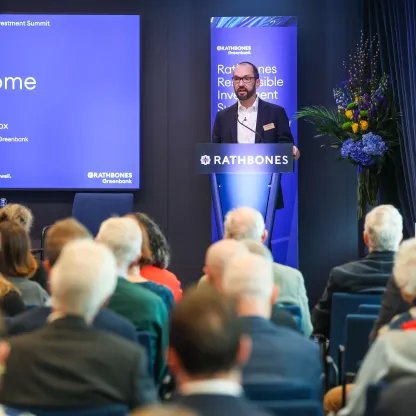Our latest Green Shoots webinar looked at how the insurance industry can influence the energy transition and mitigate climate-related risks.

Green Shoots webinar: Can we insure against climate risk?
Article last updated 21 October 2024.
As the world gets warmer and parts of it become uninsurable, we asked whether insurers can effectively model and price climate risk. We explored who does, and who should, bear the cost of climate change, and what is needed from the industry to enable the transition to a net zero economy.
Greenbank’s head of ethical, sustainable and impact research Kate Elliot chaired the session, with Greenbank investment manager Joel Swift and guest speaker Isabelle L'Héritier, senior campaigner and organiser at Insure Our Future presenting.
Our speakers explored the significant challenges facing the insurance industry as a result of climate change and increasing severity and frequency of natural disasters.
Background
Joel set the scene for the discussion and explained how increasing natural catastrophes are not only reshaping the environment but are challenging the insurance industry’s ability to price and manage risk effectively. He explained the three main types of risks arising from climate change:
- physical risks which involve damage to property and assets caused by events like hurricanes, floods, and rising sea levels
- transition risks which from the costs associated with shifting to a low-carbon economy, including changes in policies, consumer behaviour and business practices
- prudential risks which refer to risks that could affect the financial stability of insurers, potentially affecting their ability to meet policyholder claims
Joel explained that the financial impact of natural disasters has been increasing, with insured losses exceeding USD$100 billion annually for the past four years. Insurers’ ability to model these risks effectively is becoming increasingly difficult as “the past is no longer a reliable indicator of the future”.
Effective price modelling is impacted by several factors including:
- outdated models where some insurers have struggled to adapt their risk models to account for the increased frequency and severity of natural disasters
- population growth in regions prone to extreme weather events leading to increased demand for insurance in these areas
- inflation in construction costs making it more expensive to rebuild after disasters due to the increase of global building and labour costs.
Another important factor for the increase in insurance costs is a rise in ‘secondary perils,’ such as wildfires and floods. While less severe than events like hurricanes, these secondary perils are becoming more frequent and contribute significantly to insured losses globally.
Joel also explained what ‘the protection gap’ is — the difference between the total economic losses from natural disasters and the portion covered by insurance. This gap is particularly wide in developing regions, where private insurance covers a much smaller share of disaster losses compared to developed markets. Governments and international organisations, including the UN, are working to address this gap by providing financial assistance to vulnerable regions. However, the insurance industry also has a role to play in finding ways to supply broader coverage and ultimately use their influence to reduce the impact of natural disasters.
Looking to the future
Following Joel’s introduction to the topic and the industry, Isabelle went on to explain how, as a result of the increasing catastrophes and difficulty in effective pricing, some insurers have begun pulling out of certain markets (often whole regions) due to the unmanageable risks posed by climate change. In some cases, property owners have had to take alternative steps to protect their assets, such as self-insuring or implementing personal disaster response measures.
Additionally, legal and regulatory barriers have slowed some industry initiatives aimed at reducing greenhouse gas emissions. Isabelle highlighted how the insurance industry is uniquely positioned to help mitigate some of the risks associated with climate change and explained how the insurance industry can play an important role by:
- supporting stronger building codes and encouraging governments to enforce regulations that prevent construction in high-risk areas, such as floodplains and wildfire zones
- encouraging collaboration and partnerships between the public and private sectors, on projects like the UK’s Flood Re scheme which is helping to spread risk and ensure that insurance remains affordable for homeowners in vulnerable regions.
- creating new, innovative insurance products which offer more flexible solutions and providing pay-outs based on predetermined criteria (for example, the intensity of a storm) which might allow for faster claims processing
- moving away from fossil fuel investments and instead shift the focus to supporting the clean energy transition, aligning with broader efforts to reduce global emissions and address climate change directly.
The insurance industry is at a pivotal moment in its response to climate change and Isabelle noted that ‘while the fossil fuel industry needs insurance, the insurance industry doesn’t need fossil fuels’. While the challenges facing the industry are significant, there are also clear opportunities to encourage positive impact. By focusing on adaptation, risk management, and sustainability, the industry can help mitigate the effects of climate change and ensure that coverage remains available where it is, and to those who rely on it, the most following a catastrophe.
—
Green Shoots is Greenbank’s lunchtime webinar series where we are joined by specialist guest speakers to explore a sustainable investment topic.







